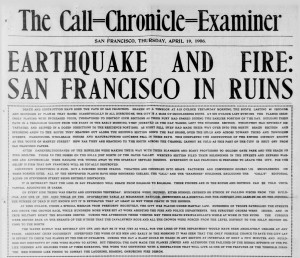 My capacity for metaphors is somewhat limited, so forgive me if I repeat a word I tweeted recently (“tweet-peat”?): Yesterday the Library and the NEH held a news conference celebrating the “odometer” of the Chronicling America program’s surpassing 1 million digitized pages from historic newspapers. Seven new partner states have been added, bringing the total to 22.
My capacity for metaphors is somewhat limited, so forgive me if I repeat a word I tweeted recently (“tweet-peat”?): Yesterday the Library and the NEH held a news conference celebrating the “odometer” of the Chronicling America program’s surpassing 1 million digitized pages from historic newspapers. Seven new partner states have been added, bringing the total to 22.
This past Friday morning, the site hosted more than 975,000 pages. That same day, the system was updated, bringing the total to 1,249,747 pages. Not to be too specific.
A text-heavy page of this morning’s Washington Post took me about 14 minutes to read, top to bottom. At that rate, I could read day and night for the next 33 years and still not get through every page on Chronicling America.
As I reported last week, the site itself has also been upgraded and enhanced for users.
If you haven’t taken the time to explore Chronicling America, give it a shot — but beware: If you love history, or if you delight in the quaint prose of American journalism circa 1900, you might find several hours elapse seemingly in minutes. As the media have reported (here and here, for instance), there are many great discoveries to be made.
As participants in the event noted, even though the pages are digitized from microfilm, searching them is a far cry from the days of hunching over a microfilm reader and turning a crank in (often vain) hopes of spotting the right article. The database is fully text-searchable, and searches can be restricted by a variety of variables such as date, state and newspaper. It also includes a sprawling listing of 140,000 newspapers published in America since 1690 with details on where to find those that don’t yet exist in digital form.
High-resolution images can be saved and printed, along with basic PDFs, and each page has its own permalink. Wouldn’t it be great to see some of them start showing up on sites like Wikipedia — for instance, the page above linked to the entry about the 1906 San Francisco earthquake?
A few months back, I speculated about what the 1 millionth page might be. Turns out it was too hard to pick just one, especially when so many partners are contributing so much. Instead, the partners picked 11 ceremonial “1 millionth pages” [PDF link], each with an interesting story to tell.
After the jump is an excerpt from remarks made at the news conference by Associate Librarian for Library Services Deanna Marcum. (Below she is pictured at the podium with Acting NEH Chairman Carole Watson in the background. Photo courtesy of NEH by frasierphoto.com.)
Read more »

